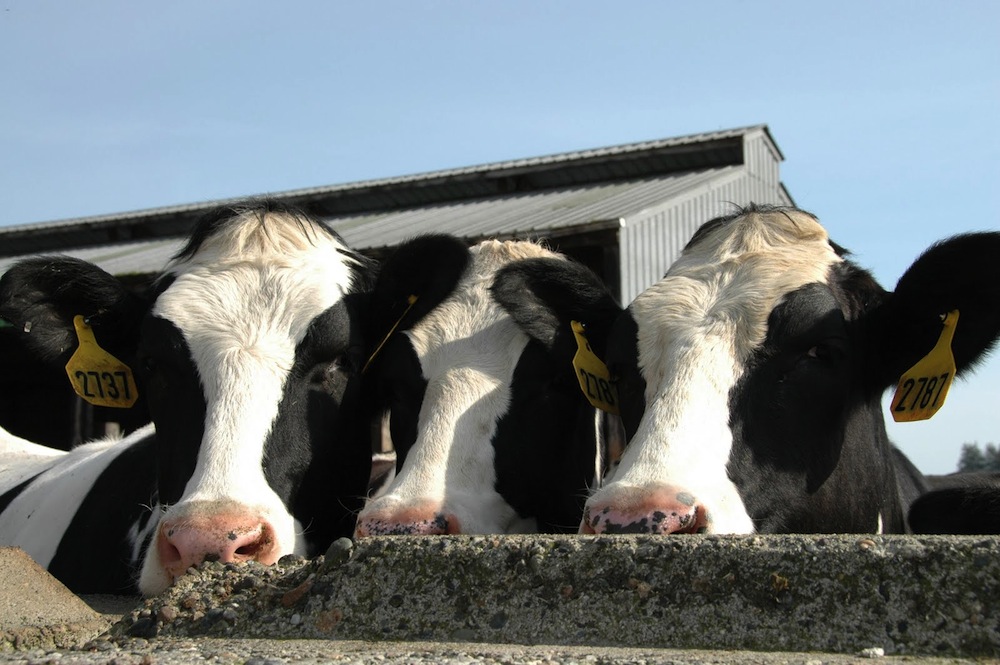Your Cheeseburger Is Leaving a Giant Environmental Footprint

Beef production takes a big toll on the environment, according to one of the most comprehensive studies to date on livestock management in the United States.
To make one steak, 28 times more land, 11 times more irrigation water, five times more greenhouse-gas emissions and six times more fertilizer is needed compared to what's required for other sources of commonly eaten protein, like pork and poultry, the researchers found.
"We were trying to see how many resources we take from planet Earth in order to create what we are eating," Ron Milo, the study's co-principal investigator and a professor of plant sciences at the Weizmann Institute of Science in Israel, told Live Science. "We found that it is much larger for eating beef." [7 Perfect Survival Foods]
Milo and his colleagues collected data on the environmental costs per calorie of dairy, poultry, pork, eggs and beef — foods that account for 96 percent of the calories Americans get from animals. The researchers consulted records from the U.S. Department of Agriculture, the Department of the Interior and the Department of Energy from 2000 to 2010.
The environmental costs of dairy, poultry, pork and eggs are fairly similar, the researchers found.
Plants — including potatoes, wheat and rice — require even fewer resources, the researchers also reported. Compared to plants, nonbeef animals require an average of six times as much land, half as much irrigation water, two times as much greenhouse-gas emissions and three times as much fertilizer use.
In contrast, the same number of calories from beef is much more taxing on the environment — requiring 160 times more land, eight times more irrigation water, 11 times more greenhouse-gas emissions and 19 times more fertilizer than plants, according to the researchers.
Get the world’s most fascinating discoveries delivered straight to your inbox.
The costs include the land, water and fertilizer needed to grow food for the animals. For instance, the researchers based greenhouse-gas emissions on methane associated with the animals' flatulence and manure, and pollutants associated with the tractors and fertilizer production.
Other studies have identified beef as a major drain on environmental resources, but this is one of the largest investigations on the environmental costs of livestock in the United States, said Nathan Pelletier, president of the Global Ecologic Environmental Consulting and Management Services in British Columbia, Canada.
"It's a good message to reiterate," Pelletier told Live Science. "What remains to be seen is to what extent this information will influence policymaking."
Still, the new study can help people make informed decisions about what to eat for dinner, the researchers said.
"Maybe I like beef very much," Milo said. "But from knowing those numbers, maybe I could just eat it once a week, or once every two weeks."
The researchers published the findings today (July 21) in the Proceedings of the National Academy of Sciences.
Follow Laura Geggel on Twitter @LauraGeggel and Google+. Follow Live Science @livescience, Facebook & Google+. Original article on Live Science.

Laura is the managing editor at Live Science. She also runs the archaeology section and the Life's Little Mysteries series. Her work has appeared in The New York Times, Scholastic, Popular Science and Spectrum, a site on autism research. She has won multiple awards from the Society of Professional Journalists and the Washington Newspaper Publishers Association for her reporting at a weekly newspaper near Seattle. Laura holds a bachelor's degree in English literature and psychology from Washington University in St. Louis and a master's degree in science writing from NYU.


